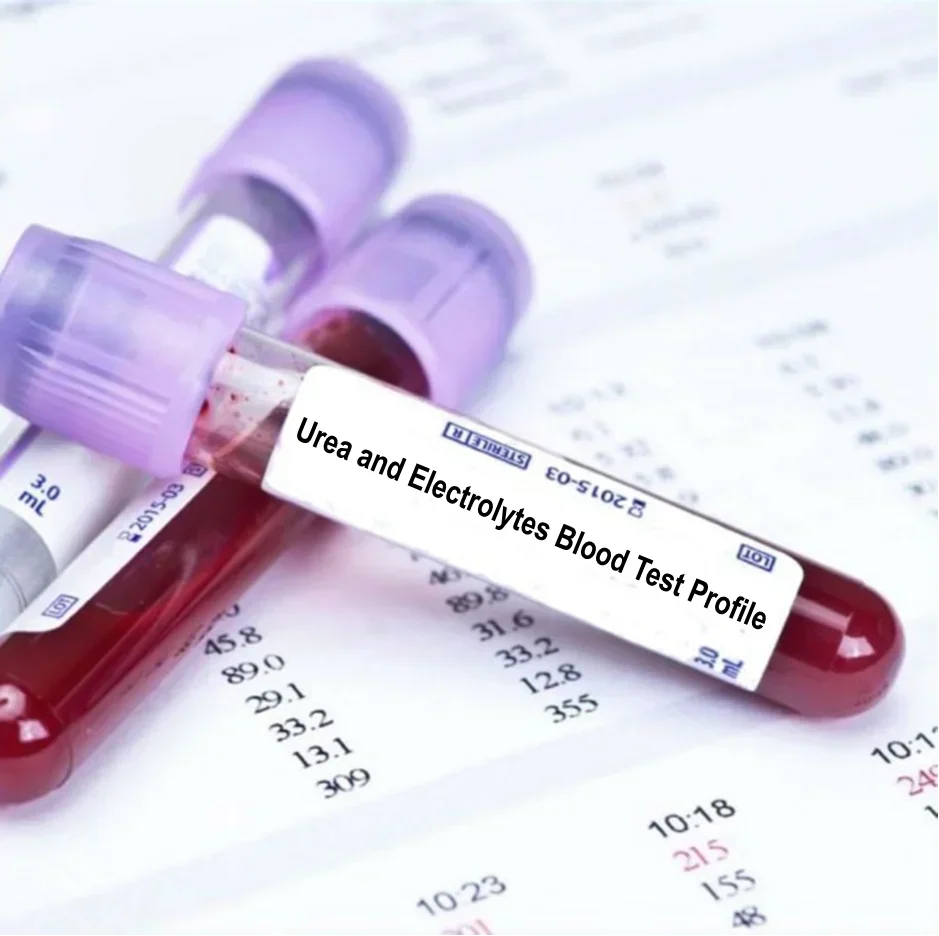Urea and Electrolytes: What is a U & E Blood test?


A Urea and Electrolytes (U&E) test is a commonly requested blood test that evaluates key markers of kidney function and the body's fluid and electrolyte balance. It measures levels of urea (a waste product formed by the liver), as well as critical electrolytes such as sodium, potassium, chloride, and bicarbonate. These components play vital roles in regulating heart rhythm, nerve function, hydration, and muscle activity. Even minor imbalances can signal an underlying health issue that requires prompt attention. The primary purpose of a U&E test is to detect abnormalities that could indicate kidney dysfunction, dehydration, or electrolyte imbalances. These imbalances can arise from chronic conditions like hypertension or diabetes, as well as from acute issues such as infection, medication side effects, or severe vomiting and diarrhoea. For individuals experiencing persistent fatigue, confusion, irregular heartbeat, or swelling, a U&E test provides essential insights into potential root causes. To monitor kidney health from the comfort of your home, consider the Kidney Health Home Blood Test Kit. It checks core markers such as urea, creatinine, and eGFR, helping users detect early signs of kidney stress before symptoms escalate. For broader health screening, the Health and Lifestyle Blood Test includes kidney markers along with liver function, cholesterol, and key vitamins—ideal for routine wellness checks or those managing chronic health concerns. Incorporating these tests into your routine not only offers peace of mind but allows for early intervention, which can be crucial in managing health proactively. At-home testing is discreet, accurate, and convenient, enabling individuals to take control of their wellbeing with minimal disruption to daily life.
The U&E test is a simple blood test carried out via venepuncture, typically from a vein in the arm. In a clinical setting, a healthcare professional will draw the blood sample, which is then analysed in a laboratory. Results are usually available within one to three working days, depending on the testing provider. However, many individuals now prefer the convenience of at-home testing. With modern kits like the Fear Nothing Blood Test, sample collection is straightforward and user-friendly. These kits include everything needed for a safe and hygienic finger-prick sample, which you post back to a certified lab in the pre-paid packaging provided. The test includes a full spectrum of health markers, including kidney function and electrolytes, making it an excellent option for those wanting a deeper dive into their health profile. There’s typically no fasting required for a U&E test, unless it's being combined with other panels. Always follow the instructions provided with your testing kit. If you’re unsure whether your symptoms warrant testing, or you’re managing medications that affect your kidneys or electrolytes (like diuretics or blood pressure tablets), it’s especially important to monitor these biomarkers. The ease of at-home tests eliminates long GP waiting times, and empowers individuals to respond to symptoms more quickly. The Energy and Fatigue Blood Test is another valuable option for those experiencing low energy or lethargy. It evaluates whether kidney-related issues or electrolyte disturbances might be contributing to these symptoms—something that might otherwise go overlooked in a basic health check.
There are numerous clinical and lifestyle-related reasons to take a U&E test. In clinical practice, it is one of the most frequently ordered blood tests, used to assess kidney health, screen for dehydration, and detect imbalances in key electrolytes. If your kidneys are not functioning properly, toxins like urea can accumulate in the body, leading to fatigue, nausea, swelling, and even confusion or irregular heart rhythms. Common reasons to undergo a U&E test include symptoms such as persistent tiredness, bloating, shortness of breath, or light-headedness. It is also frequently recommended for individuals taking medications that impact fluid or electrolyte balance—such as antihypertensives, corticosteroids, or chemotherapy. Those with chronic health conditions such as diabetes, heart disease, or high blood pressure are typically advised to monitor kidney function regularly to prevent complications. The Full Blood Count (FBC) Blood Test is a helpful complementary test, as it provides a broader view of your health, assessing for anaemia, infections, and immune response, which can help contextualise U&E results. Many people overlook how interconnected these systems are—issues with kidney function can also affect red blood cell production and immune resilience. Taking proactive action with reliable testing supports better health outcomes.
Interpreting U&E test results involves understanding the balance and function of several key markers: Urea: High levels may indicate kidney dysfunction, dehydration, or high protein intake, while low levels can be linked to liver disease or malnutrition. Creatinine: A waste product filtered by the kidneys; elevated levels may suggest impaired kidney function. eGFR (estimated Glomerular Filtration Rate): This gives a snapshot of how well your kidneys are filtering. A lower eGFR may indicate declining kidney function. Sodium and Potassium: Crucial for fluid balance, nerve transmission, and muscle contraction. Imbalances can cause confusion, muscle cramps, weakness, or irregular heartbeat. Chloride and Bicarbonate: Help maintain acid–base balance and hydration status. Mild abnormalities may not always be cause for concern, especially if temporary factors like dehydration or diet played a role. Your results may prompt changes in hydration, diet, or medication. In more serious cases, further investigation such as imaging or referral to a specialist may be required. The value of early testing cannot be overstated—catching subtle signs of imbalance before they evolve into major health concerns is key. Choosing the right test can provide peace of mind and empower you to take action confidently. To explore a wide range of at-home diagnostics tailored to your health needs, visit Welzo’s full health test collection.
Interpreting your U&E test results involves understanding how each component reflects your body’s internal balance and kidney performance. Elevated urea or creatinine levels may suggest kidney strain or impaired filtration. Conversely, low urea could indicate liver disease or low protein intake. The eGFR (estimated Glomerular Filtration Rate) is one of the most reliable indicators of kidney function—lower values may indicate chronic kidney disease or reduced kidney performance, particularly in older adults or those with hypertension or diabetes. Electrolytes are also key. High sodium can signal dehydration or adrenal issues, while low sodium may point to fluid overload, heart failure, or certain medications. Potassium imbalances can be dangerous, potentially leading to cardiac irregularities. Chloride and bicarbonate help maintain acid-base balance and hydration, and fluctuations can reflect respiratory or metabolic imbalances. This adds clarity and reassurance for users managing complex health needs. If results fall outside the normal range, your next steps might include dietary adjustments, medication review, further testing, or speaking with a GP. Catching changes early is essential to preventing escalation, particularly for those with existing conditions or on long-term medications.
If your results show irregularities, it’s important to act. For minor imbalances, simple lifestyle changes such as increasing fluid intake, adjusting dietary salt or potassium, or reviewing medications with your GP may resolve the issue. However, consistent abnormalities, especially in urea, creatinine, or eGFR, could indicate progressive kidney dysfunction. After receiving your results, Welzo’s platform allows you to access detailed reports and even connect with a licensed clinician if further interpretation is needed. Consistent tracking, combined with evidence-based recommendations, puts you in control of your health journey and helps prevent future complications.
What is tested in a U&E blood test?
A U&E test measures urea, creatinine, and key electrolytes such as sodium, potassium, chloride, and bicarbonate. These values help assess kidney health, fluid balance, and acid–base regulation.
Do I need to fast for a U&E test?
Fasting is generally not required unless your test includes additional panels like blood sugar or cholesterol. Always check the instructions included with your test kit.
What can cause abnormal U&E results?
Common causes include dehydration, kidney disease, high salt intake, diuretic use, certain medications, and chronic conditions like diabetes or heart disease.
How quickly will I receive my results?
If using a home test kit such as the Fear Nothing Blood Test, results are typically available within 24 to 48 hours after the lab receives your sample.
Can I use at-home kits instead of going to the GP?
Yes. Kits like the Full Blood Count (FBC) Blood Test or Kidney Function Home Blood Test Kit offer hospital-grade accuracy and convenience, making them ideal for routine screening or ongoing monitoring between GP visits.
Monitoring kidney health and electrolyte balance is essential—not only for diagnosing existing problems but for preventing long-term complications. The U&E blood test remains one of the most reliable and widely used diagnostic tools in both clinical and home settings. Whether you’re experiencing symptoms like fatigue, swelling, or dehydration, or simply want to take control of your health, testing offers clarity, guidance, and peace of mind. By opting for trusted at-home options like the Kidney Function Home Blood Test Kit or the comprehensive Fear Nothing Blood Test, you’re taking a proactive approach to your wellbeing. These tests offer hospital-grade accuracy, fast turnaround, and expert support, all from the comfort of your home. With regular monitoring and informed decisions, you can stay ahead of your health and catch potential issues before they develop into serious concerns. Explore Welzo’s full range of tests to find the one that fits your needs, and take the first step towards empowered, data-driven health management today.








Plus get the inside scoop on our latest content and updates in our monthly newsletter.